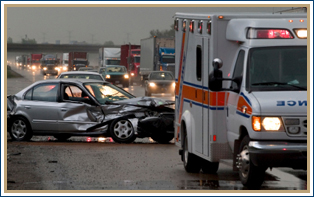

About Michigan First Party Auto Accident
Tips
In Michigan, people rely upon their motor vehicles on a day-to-day basis. Throughout Detroit, residents use their vehicles to commute to and from work, to run various errands, to transport their family and friends, and to seek out general entertainment. While cars are extremely convenient, the sad fact is that often times, people choose to partake in negligent driving behaviors, such as:
•driving under the influence (DUI)
•talking on cell phones and texting
•driving while tired
•talking to passengers while driving
•ignoring traffic laws, signals and signs
•speeding
•driving recklessly
Auto Accidents: Auto accidents can cause a number of financial and medical burdens. More serious accidents can result in severe physical impairment and even death. If you are involved in a car accident in Michigan, then you need to update yourself on Michigan No Fault law, and also “First Party” No Fault law, which shed light on your right to wage loss; attendant care; medical bills for life; replacement services; mileage reimbursement; and Third-Party basics.
I. Wage Loss
Every no-fault auto policy is required to provide wage loss coverage in case you are injured in an auto accident and are unable to work. A victim may obtain 85 percent of their pay for up to three years if a doctor has determined the injuries obtained in the accident prevents the victim from working. Money obtained for wage loss reimbursement is tax-free. Also, the amount of wage loss recovery is reduced by 15% for taxes and is limited to a monthly maximum (currently $4,070 per month). If your income exceeds the monthly maximum, you may wish to consider additional wage loss coverage to make up the difference in case of a disabling injury.
2. Medical Expenses
Regardless of fault, your auto insurance policy must provide coverage for all reasonable and necessary medical expenses incurred as a result of an auto accident.
3. Replacement Services
Your no-fault auto insurance policy entitles you to recover up to $20 per day for services that you no longer can do because of the accident (3 years from date of accident is the maximum). Replacement services commonly include household tasks, lawn care, babysitting, grocery shopping, etc. These services must be "reasonably incurred" because of the accident to be recoverable.
4- Attendant Care
Under Michigan No-fault auto insurance law, companies are required to provide nursing services or attendant care if a doctor says that they are medically necessary. If injuries are serious, doctors may order supervision and assistance for prolonged periods of time, sometimes around the clock. Problems with auto insurance companies paying for attendant care often arise because of a lack of firm guidelines indicating how much the insurance company must pay for these services. Once the need for attendant care services is established, the insurer is obligated to pay for the attendant care regardless of the identity of the persons rendering the care. In determining what is a "reasonable charge" for family provided attendant care under Section 3107(1)(a).
5- Survivor’s loss
The dependents (spouse and children) of a deceased individual who is killed in a car accident are entitled to a survivor's loss benefit for up to 3 years from the date of the accident, subject to the same maximum monthly benefit formula applied to wage loss.
Please Note:
If you choose to begin a lawsuit against your insurance company for No-Fault benefits, you must file a lawsuit within one year of the date on which the last unpaid No-Fault benefit was incurred. If you fail to file your lawsuit within this one year period, you will lose the right to have the benefit or expense paid

Under the Michigan No-Fault Act, whenever a car accident occurs in Michigan and causes either personal injury or death, the car accident victim can pursue two separate and distinct claims. One is economic in nature, the other is non-economic.
The first claim is for no-fault insurance benefits, or legally known as personal protection benefits (PIP).
The second type of claim — the non-economic one — is the tort liabilty claim or otherwise referred to as a third-party claim, tort claim, non-economic loss claim and residual bodily injury (RBI) claim. Under the Michigan No-Fault Insurance Act, a car accident victim can bring a private lawsuit against the at fault driver for non-economic losses but only if the victim suffered one of three types of “threshold” injuries — death, permanent serious disfurement or a serious impairment of a body function and his /her life style change because of the injury.